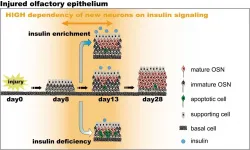(Press-News.org) COLUMBUS, Ohio - Up to 38.6% of people with colon cancer who have a hereditary cancer syndrome--including 6.3% of those with Lynch syndrome--could have their conditions remain undetected with current universal tumor-screening methods, and at least 7.1% of people with colorectal cancer have an identifiable inherited genetic mutation, according to new data published by scientists at The Ohio State University Comprehensive Cancer Center - Arthur G. James Cancer Hospital and Richard J. Solove Research Institute (OSUCCC - James).
Experts say their data, which was gathered from a cohort of more than 3,300 colorectal cancer patients treated at 51 hospitals across Ohio, makes a strong scientific argument for implementing multi-gene panel testing as part of the standard of care for all colorectal cancer patients.
"Finding ways to identify high-risk individuals among colorectal cancer patients is critically needed to better manage this disease and proactively identify family members who may also be impacted," says Rachel Pearlman, MS, LGC, first author of the study and a genetic counselor/researcher at the OSUCCC - James. "Genetic screening has changed dramatically in the past 10 years, allowing us to screen individuals for numerous known genetic mutations for much lower costs. This is a powerful tool that we need to embrace more broadly for cancer prevention and surveillance."
Study Methods and Results
For this study, OSUCCC - James researchers wanted to know if using a multi-level genetic testing approach could better identify hereditary genetic risk factors (passed down through families) that dramatically increase a person's lifetime risk of cancer but often go undetected until cancer occurs.
Researchers identified 3,310 adults who had undergone surgery for invasive colorectal cancer from January 2013 to December 2016. Individuals were recruited as part of the Pelotonia-funded Ohio Colorectal Cancer Prevention Initiative (OCCPI), a statewide research initiative led by Heather Hampel, MS, LGC. Hampel is a member of the OSUCCC - James Molecular Carcinogenesis and Chemoprevention Program, as well as a professor and associate director of the Division of Human Genetics at the Ohio State College of Medicine.
The study was launched to screen newly diagnosed colorectal cancer patients and their biological relatives for Lynch syndrome, a cancer-causing condition that occurs if a person inherits a mutation in one of four genes. People with Lynch syndrome are at higher risk to develop colorectal, endometrial (uterine), ovarian and stomach cancer than are average-risk individuals.
All study participants received universal tumor screening for mismatch repair (MMR) deficiency. This characteristic is common in tumors from patients with Lynch syndrome and suggests that the tumor would respond well to immunotherapy, which is a novel cancer treatment using your body's own immune system to fight the tumor, if necessary.
Individuals who met at least one of the trial-inclusion criteria also received multi-gene panel testing to identify harmful mutations. Genetic testing criteria included: MMR deficiency; colorectal cancer diagnosis before age 50; multiple primary tumors (colorectal cancer/endometrial cancer); or a first-degree relative with colorectal or endometrial cancer.
Researchers report in this new analysis that about 16% (525 patients) of participants had MMR deficiency, and about 7% had an inherited mutation. The scientists note that if universal tumor screening for Lynch syndrome had been the only method used to screen for hereditary cancer syndromes, more than 38% of patients who tested positive would have been missed--including more than 6% of individuals found to have Lynch syndrome through multi-gene testing methods.
"This is a significant and important discovery. By using pan-cancer multi-gene panel testing for all colorectal cancer patients, we could identify many individuals who are at increased risk for future cancer development and identify actionable therapeutic targets for their current cancer," says Hampel, senior author of the study. "Adopting modern testing methods as part of standard clinical practice for patients with colorectal cancer could literally save thousands of lives through early detection and surveillance of other family members who are at increased risk to develop the cancer based on inherited genetic mutations."
INFORMATION:
Researchers report their findings in the in medical journal JCO Precision Oncology. Co-authors in the study include Wendy Frankel, MD; Benjamin Swanson, MD; Dan Jones, MD, PhD; Weiqiang Zhao, MD, PHD; Rachel Pearlman, MS, CGC; Ahmet Yilmaz, PhD; Kristin Miller, BS; Jason Bacher, BA; Christopher Bigley, MS; Lori Nelsen, BA; Paul J. Goodfellow, PhD; Richard M. Goldberg, MD; Electra Paskett, PhD, MSPH; Peter G. Shields, MD; Jo L. Freudenheim, PhD; Peter P. Stanich, MD; Ilene Lattimer, BSN; Mark Arnold, MD; Thomas W. Prior, PhD; Mitchell Haut, MD; Matthew F. Kalady, MD; Brandie Heald, MS, CGC; Ian Paquette, MD; David J. Draper, MD; Joanna M. Brell, MD; Sameer Mahesh, MD; Kisa Weeman, MD; Shyamal Bastola, MD; Jeffrey Zangmeister, MD; Aruna Gowda, MD; Filix Kencana, MD; Albert Malcolm, MD; Yinong Liu, MD; Sharon Cole, MD; Charles Bane, MD; Chaoyang Li, MD; Esther Rehmus, MD; Colin C. Pritchard, MD, PhD; Brian H. Shirts, MD, PhD; Angela Jacobson, MS, CGC; Shelly A. Cummings, MS, CGC; Albert de la Chapelle, MD, PhD; and Heather Hampel, MS, LGC.
A team of Welsh academics has developed a new method of supporting health professionals to make clinical decisions about people who may be at risk of taking their own lives.
While the UK may have one of the lowest rates of suicide in the world, it is still the biggest cause of death in men under 45, so being able to make a Structured Professional Judgement about who might attempt suicide and knowing how to intervene is vitally important.
Researchers at Swansea and Cardiff universities have put together the Risk of Suicide Protocol (RoSP) which guides a professional to look at 20 aspects of a person's life known ...
PHILADELPHIA (May 17, 2021) - Researchers have known for some time that insulin plays a vital role in regeneration and growth in some types of neurons that relay environmental sensory information to our brains, such as sight. However, they know relatively little about the role of insulin in the sense of smell. Now, investigators at the Monell Chemical Senses Center have shown that insulin plays a critical role in the maturation, after injury, of immature olfactory sensory neurons (OSNs). The team published their findings in eNeuro earlier this month.
"Our findings suggest ...
One of the projected effects of a warming climate for species living on mountain slopes is moving their distributions upslope as their habits shift upwards. Eventually, since mountains have a limit to their elevation, a species may have no more habitat to move up to and therefore go extinct. Tracking how and where this is happening is tough, though, if you don't have a good idea of where the species are now. That's the situation in places such as Africa, which have tremendous biodiversity but spotty ecological baseline data.
So University of Utah researchers set out to assess the status of bird species in Ethiopia's Bale Mountains through six years' worth of bird banding efforts at five sites. The sites spanned ...
Mothers who are Hispanic or who come from rural or low socioeconomic status neighborhoods are less likely to have their child's critical heart condition diagnosed before birth, according to a new study in the journal Circulation.
This is the largest and most geographically diverse study of these challenges to date. The study compared patient data of more than 1,800 children from the United State and Canada diagnosed with two of the most common, and the most serious, critical congenital heart defects: hypoplastic left heart syndrome (HLHS), when the left side of the heart is not developed completely, and transposition of ...
Patients with chronic kidney disease and Type 2 diabetes who took the experimental drug finerenone were about 30% less likely to develop the heart rhythm disorder atrial fibrillation (AFib) than those taking a placebo, according to data presented at the American College of Cardiology's 70th Annual Scientific Session.
Last year, researchers reported that the trial, called FIDELIO-DKD, met its primary endpoint showing a significant benefit of finerenone, a nonsteroidal, selective mineralocorticoid receptor antagonist, in terms of a composite of sustained decrease in kidney function, kidney failure and renal death. The new analysis reveals that patients derived these benefits regardless of their history with AFib and suggests that taking finerenone also reduced the rate of ...
A subgroup of patients who experienced an out-of-hospital cardiac arrest (OHCA) that did not respond to standard advanced cardiac life support (ACLS), were immediately transported to a cardiac care center, and placed on a device similar to a heart-lung bypass machine were more likely to have survived with good brain function six months later than similar patients who received standard care at the site where the OHCA occurred. The study was presented at the American College of Cardiology's 70th Annual Scientific Session.
"This study--the largest randomized clinical trial that has been conducted to address this question--shows that a hyperinvasive ...
The ocean is a big place with many deep, dark mysteries. Humans have mapped no more than 20% of the sea, and explored less. Even the kelp forests of Southern California -- among the best studied patches of ocean on the planet -- hide species not yet described by science.
Now, UC Santa Barbara's Thomas Turner has published a paper in the journal Zootaxa describing four new species of sponges. These novel specimens weren't dredged from the murky depths or found on some distant seamount, but collected locally from popular dive spots. The study brings Turner's new species count to five, and the scientist believes there may be dozens yet to discover and describe along the West ...
Southern lesser galagos (Galago moholi), a species of primate that lives in southern Africa, boast big, round eyes and are so small they can fit in your hand.
A new study from an international team of scientists, however, suggests that there may be a downside to their cuteness: The trade in lesser galagos, also known as bushbabies, which some people keep as pets, may have shifted the genetics within their wild populations over the span of decades, according to the research. Those changes could undercut the ability of the critters to adapt as human farms and cities grow throughout the region.
The study was published recently in the journal Primates and ...
Alcohol appears to have an immediate--or near-immediate--effect on heart rhythm, significantly increasing the chance that an episode of atrial fibrillation (AFib) will occur, according to new data presented at the American College of Cardiology's 70th Annual Scientific Session.
The data revealed that just one glass of wine, beer or other alcoholic beverage was associated with twofold greater odds of an episode of AFib occurring within the next four hours. Among people having two or more drinks in one sitting, there was a more than threefold higher chance of experiencing AFib. Using an alcohol sensor placed on participants' ankles, which passively monitored alcohol intake, the investigators ...
As Covid-19 spread around the world, stock markets in individual countries took a major hit - yet stock markets in China where the disease first struck avoided significant falls - researchers at Lero, the Science Foundation Ireland Research Centre for Software found.
A research paper Immune or at-risk? Stock markets and the significance of the COVID-19 pandemic by a Lero team based at University of Limerick confirmed that the growth in COVID-19 cases largely explained changes in stock prices, but surprisingly did not have the same impact in China or on the global index ...


